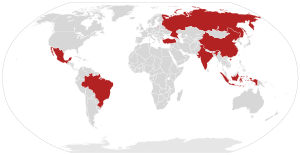E7 (countries)
The E7 (short for "Emerging 7") is the seven countries Brazil, China, India, Indonesia, Mexico, Russia and Turkey, grouped together because of their major emerging economies.[1] The term was coined by the economists John Hawksworth and Gordon Cookson at PricewaterhouseCoopers in 2006.[2]
The growth of the E7 countries has been characterized in comparison with its size versus the Group of Seven countries, which had made up many of the largest economies in the world in the 20th century. In 2011, the E7 were predicted to have larger economies than the G7 countries by 2020.[3] By 2014, the E7 countries had passed the G7 countries based on purchasing power parity terms.[4] Other estimates said the E7 were 80% of the G7 in 2016 in PPP.[5] In 2016, another prediction estimated that the E7's economies would be larger than the G7 in 2030.[6] PwC predicted that the E7 could be 75% larger than the G7 in PPP terms by 2050.[7]
List[edit]

The following table is an estimate for largest 10 economies by nominal GDP using PPP exchange rates for 2030 made by UK based Standard Chartered.[8]
| Rank | Country | 2030 |
|---|---|---|
| 1 | 64.2 | |
| 2 | 46.3 | |
| 3 | 31.0 | |
| 4 | 10.1 | |
| 5 | 9.1 | |
| 6 | 8.6 | |
| 7 | 7.9 | |
| 8 | 7.2 | |
| 9 | 6.9 | |
| 10 | 6.1 |
Below are the E7 countries and their predicted economies in 2050[9][10] as predicted by Goldman Sachs:
| Country | Economy in USD (billions) |
|---|---|
| 70,710 | |
| 37,668 | |
| 11,366 | |
| 9,340 | |
| 8,580 | |
| 7,010 | |
| 6,943 |
See also[edit]
References[edit]
- ↑ "UK economy risks 'playing in slow lane of history'". BBC. 2011-01-07. Retrieved 2012-01-29.
- ↑ Hawksworth, John. "The World in 2050" (PDF). PricewaterhouseCoopers.
- ↑ Emma Dunkley (2011-01-13). "China to overtake US by 2018 – PwC". Investment Week. Incisive Financial Publishing Limited. Retrieved 2012-04-16.
- ↑ Vipin, Nadda; Sumesh, Dadwal; Roya, Rahimi (2017-01-10). Promotional Strategies and New Service Opportunities in Emerging Economies. IGI Global. ISBN 9781522522072. Search this book on

- ↑ Park, Greg (2016-11-18). Integral Operational Leadership: A relationally intelligent approach to sustained performance in the twenty-first century. Routledge. ISBN 9781317070863. Search this book on

- ↑ Hodges, Dr Julie (2016-02-03). Managing and Leading People Through Organizational Change: The theory and practice of sustaining change through people. Kogan Page Publishers. ISBN 9780749474201. Search this book on

- ↑ Xing, Li (2016-03-16). The BRICS and Beyond: The International Political Economy of the Emergence of a New World Order. Routledge. ISBN 9781317040002. Search this book on

- ↑ "These Could Be the World's Biggest Economies by 2030". Bloomberg.com. 8 January 2019. Retrieved 12 January 2019.
- ↑ Thornton, Philip (2006-03-03). "New E7 nations 'will overtake G7 by 2050' – Business News – Business". The Independent. Archived from the original on 27 January 2010. Retrieved 2012-01-29. Unknown parameter
|url-status=ignored (help) - ↑ "E7 Countries". Wn.com. Retrieved 2012-01-29.
| This article about an international organization is a stub. You can help EverybodyWiki by expanding it. |
This article "E7 (countries)" is from Wikipedia. The list of its authors can be seen in its historical and/or the page Edithistory:E7 (countries). Articles copied from Draft Namespace on Wikipedia could be seen on the Draft Namespace of Wikipedia and not main one.
